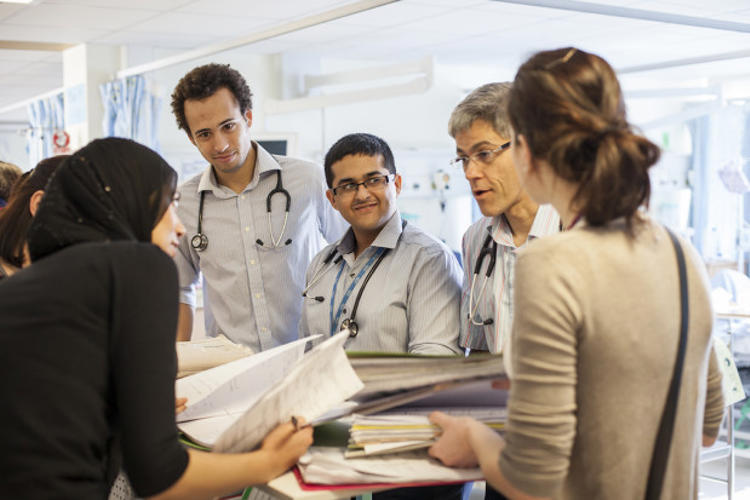At the RCP, we recognise the number of doctors in the UK displaced from their home countries as a consequence of geopolitical crises. We understand that there are challenges to overcome to re-establish clinical practice in a new healthcare system and that it can be difficult to evidence ongoing professional development while navigating this journey.
Recognising these issues, the RCP Global team has the following aims:
- To provide a welcoming and supportive environment at the RCP for physicians who are refugees.
- To signpost available options for support, advice and training.
- To explore pathways to employment for refugee physicians through engagement with local and national stakeholders.
Definition of refugee doctors
To be eligible for RCP concessions, you must be able to provide original evidence that you:
- Have an eVisa confirming your immigration status and/or confirmation of support from an educational programme funded by NHSE (such as REACHE/Building Bridges)
- Are not currently in employment
- Are an aspiring or established physician (evidenced in your CV).

RCP concessions
If you fit the eligibility criteria listed above, you can apply for the following:
1. RCP membership: as an aspiring or established physician, you can apply for one year’s free membership and get the second year half price. Membership has the following benefits:
- free access to streamed CPD content via RCP Player, including a series dedicated to trainees
- free access to e-learning modules such as Breaking bad news
- discounted access to education and training opportunities to develop leadership and communication skills
- free submission to Clinical Medicine (ClinMed), and regular updates on ClinMed, Future Healthcare Journal and Commentary content
- free and discounted access to conferences and events where you can network with colleagues, such as Call the medical registrar
- access to our Members and Fellows Lounge at The Spine boasting impressive views of Liverpool and beyond, free Wi-Fi, a coffee machine, access to charging points and more
- opportunity to apply to a number of awards, bursaries and prizes that are exclusive to RCP members and fellows.
2. RCP events: the RCP hosts several events, courses and conferences each year. With your free one-year membership as a refugee physician, the following courses/events may be of particular interest:
- Call the medical registrar - free for members
- Regional updates - lowest possible rate
- RCP webinars - a wide selection of free videos and podcasts, with the option to book CPD-accredited events at additional cost
- Med+/Medicine conference
- Workplace based assessment workshop
For further information on membership and membership benefit, please refer to membership FAQs and membership benefits.
How to apply
Applications closed on Monday 6 October. Further updates will be provided when available.
Available options for support, advice and training
Pathways to employment
Finding clinical attachment opportunities
The RCP is not able to assist you in finding a clinical attachment. The associate dean for overseas doctors at your regional postgraduate deanery may be able to assist you to identify opportunities. You can also contact hospitals in your local region. The Conference of Postgraduate Medical Deans maintains a complete list of deaneries.
Applying for jobs
General Medical Council (GMC) registration: all doctors must be registered with the GMC, which is the regulatory body for doctors in the UK. For more information, visit the GMC website. Please note, the RCP cannot sponsor refugee doctors for GMC registration.
Where do I find posts? All UK posts are advertised via the NHS jobs website. On this website, you will need to register using your email address. From there, you can create your profile, which is a list of necessary information later used to populate your job applications.
Another platform is the trac.jobs website. You may find that jobs you apply for on the NHS jobs website open information on the trac.jobs website or vice versa. They are effectively the same thing. You can also register on this website using your email address. trac.jobs has the function of setting up alerts so that you can find out about jobs that have just been released which fit your search criteria.
What types of post should I apply for?
Many international medical graduates (IMGs) begin their NHS careers in junior clinical fellow positions. These are typically short-term posts (6–12 months), which may involve rotating between different departments. Clinical fellow posts are a good starting place to become familiar with NHS systems and the roles and responsibilities expected of doctors at different stages of postgraduate experience. We would recommend starting in a more junior post to get used to the new work environment and systems.
Search terms on the NHS jobs website: ‘clinical fellow’ ‘junior clinical fellow’ ‘senior clinical fellow’ ‘trust doctor’ ‘foundation year 2’
If you have the full MRCP(UK) qualification, it may be possible to obtain GMC registration via the postgraduate qualification route and go on to apply for specialty training posts. It is often desirable to have some UK-based experience, such as working as a clinical fellow, prior to specialty training.
Tips for applications: securing the first GMC-registered appointment in the NHS, as an IMG often requires multiple job applications. Where you are able, seek the help of a friend / former colleague / refugee organisation to help you write a competitive application.
It is important that you enter information carefully and honestly. Importantly, take time to complete the ‘supporting information’ section. This is your chance to demonstrate how your skills, experience and personal attributes make you the best person for the job that you are applying for. Give personal examples describing real-life situations that you have been involved in, and demonstrate your role and any outcomes or learning that came from the experience. It is better to mention a few examples with a good explanation than offer an exhaustive list without any explanation. It is likely that you will need to adapt the ‘supporting information’ section for each job you apply for, so that it clearly matches the job description and person specification advertised for the post.
Finally, make sure that anything you mention in your application is something that you would feel comfortable describing in more detail if questioned during an interview.
Tips for interview preparation: preparing for an interview is similar to preparing for an exam. It is important to equip yourself with the knowledge of commonly asked questions, as well as the structures you can apply to answer them. There are various resources available, but this book is very comprehensive.
Most interviewers will ask you to ‘take me through your CV’ or ‘tell me about yourself’, followed by a skills-based question, a difficult scenario and a clinical scenario (relevant to the post you are applying for).
Where you are able, practise your interview answers out loud, either by yourself or with a friend/former colleague.
My journey as a Ukrainian healthcare professional: a story of resilience and hope
We are pleased to share this compelling blog post. Which provides account from a Ukrainian healthcare professional navigating the challenges posed by the ongoing war in Ukraine.
Read it hereLatest news
Contact us
If you have any query relating to the support available for refugee physicians, please get in touch.
The RCP team is available to respond to telephone queries on +44 (0)20 3075 1631. If you are unable to speak to us please leave a voicemail.
The team can also be reached via email: RefugeePhysicians@rcp.ac.uk
Get in touch






